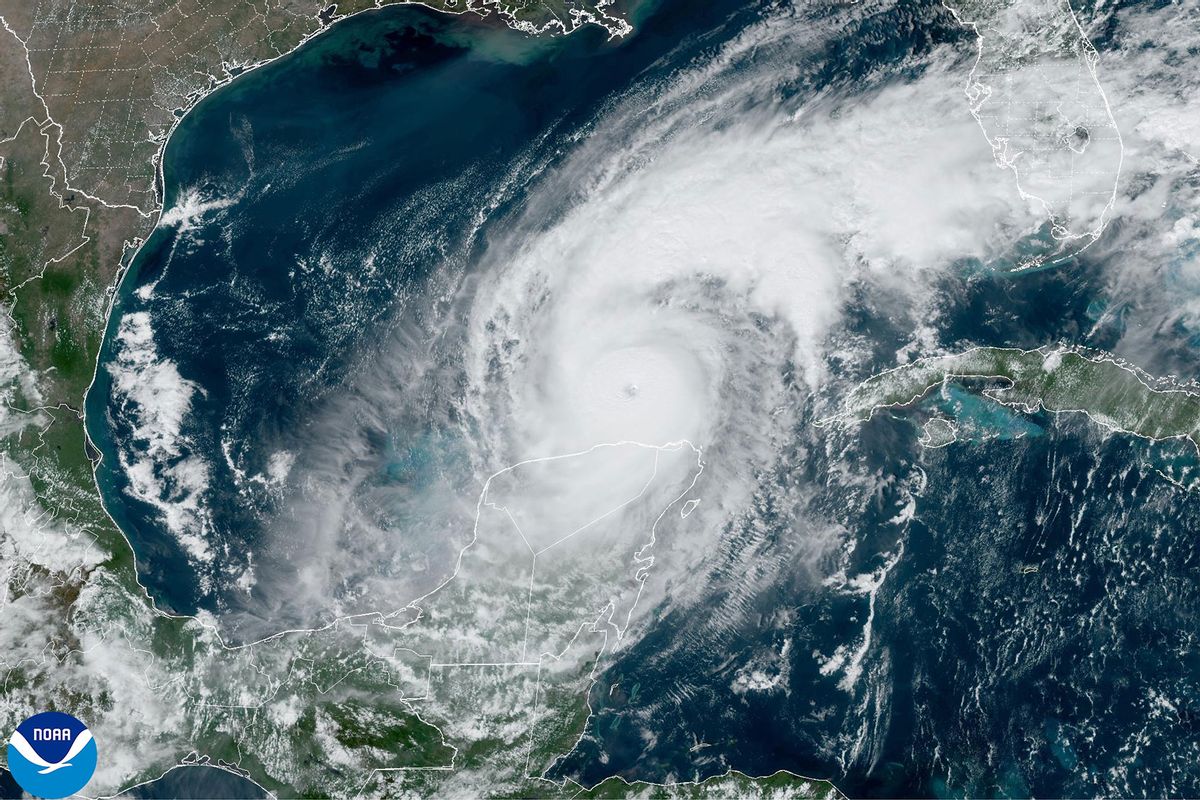Hurricane Milton is shattering records, becoming the fifth-strongest storm in the Atlantic Basin's recorded history by barometric pressure, strengthening into a Category 5 storm in just 10 hours. It has become so severe that President Joe Biden has declared a state of emergency in the soon-to-be-affected areas — is now expected to make landfall in Florida on late Wednesday. The good news for residents of the Sunshine State is that experts anticipate it will weaken into a Category 3 storm by that time, meaning that it will likely have winds between 111 to 129 mph (180 to 210 kph) instead of in excess of 157 mph (252 kph).
Yet according to experts who spoke with Salon, Milton is still going to be quite dangerous — and Floridians need to prepare accordingly.
"Hurricane Milton is an exceedingly strong and dangerous storm, which is predicted to make landfall in the west coast of Florida and bring hazards of storm surge, rain-fed flooding and extreme winds/tornadic activity — people should take the warnings and recommendations from disaster managers very seriously," Gabriel A. Vecchi, a Princeton University professor of geosciences, told Salon. "This storm is likely to be much more dangerous than those that people have experienced in the Tampa area. Further, hurricanes have impacts far from their center and dangerous currents can linger for days after the passage of a storm — it is essential to heed the warnings and recommendations coming from disaster managers over the coming days."
Tom Knutson, a senior scientist at the National Oceanic and Atmospheric Administration's (NOAA) Geophysical Fluid Dynamics Laboratory, also urged ordinary people to follow the instructions of their local emergency managers. "If they, the emergency managers, say to evacuate, they should evacuate. That's the main point. Listen to the advice of your local emergency manager."
This sort of public emergency messaging has been complicated by conspiracy theories swirling on social media, especially X, previously known as Twitter, which has seen prolific spreading of antisemitic conspiracy theories blaming Jews for causing the storms and undermining confidence in local disaster management efforts.
"There’s no question in my mind that [X CEO Elon] Musk has taken part in criminal activity that endangers our country and our people," Dr. Michael E. Mann, a climatologist at the University of Pennsylvania, told Salon.
Not to be outdone, former President Donald Trump has also been spreading falsehoods about disaster response to Hurricane Helene, which devastated the southeast U.S. in late September, leaving more than 230 people dead, with some estimates of damages ranging from $30 to $47.5 billion. Trump has alleged the Biden Administration is intentionally withholding aid from the hurricane-impacted areas where Republicans live and that FEMA funds are being redirected to migrants.
Want more health and science stories in your inbox? Subscribe to Salon's weekly newsletter Lab Notes.
"There is growing evidence that hurricanes like Milton... are made more likely by the global warming to date, and will be more so with continued global warming."
Despite the flurry of false facts about how to respond to storm like Milton and Hurricane Helene, there are experts trying to provide useful tips for people to manage the crisis. Knutson elaborated that, although one cannot definitely say climate change was the sole or even primary cause of Hurricane Milton, certain scientific facts make it clear that climate change played an important role.
"It is exacerbating the effect of the storm surge because anthropogenic climate change contributing to the observed sea level rise, and that is leading to a greater risk of coastal flooding for any given hurricane," Knutson said, but added that it's very hard to confidently say humans caused this storm to get so intense because of decades of variability in the Atlantic Basin.
As Vecchi explained, while one cannot fairly say that this hurricane would never have happened without climate change, "there is growing evidence that hurricanes like Milton — a hurricane that rapidly intensified from a Category 1 to a Category 5 in a few hours — are made more likely by the global warming to date, and will be more so with continued global warming."
Vecchi also noted that the track of the hurricane likely would have occurred with or without climate change — it follows a standard model — but that one can better understand the impending devastation that will be wrought by the storm through the lens of global warming.
"As far as Milton's track goes, though, I don't think that there is a clear case based on the evidence to say that it has a large signature of climate warming in it," Vecchi said. "Milton's track (actual and predicted) is the type of track that can happen, but now due to a warmer Gulf of Mexico (in part due to human-induced greenhouse warming) Milton had a higher probability of rapidly intensifying and having larger peak rainfall."



Shares